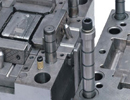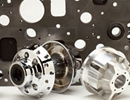Industries
EDGECAM est le principal marché de CAM pour de nombreux secteurs d'industries.
EDGECAM utilises vos propres connaissances et votre expérience pour guider le process CAM avec l'automatisation des outils pour adapter les applications - permettant ainsi de maintenir votre avantage compétitif.
EDGECAM offre les applications suivantes :

Aérospatiale
Whether manufacturing parts for defense, civil aviation or space applications, the aerospace industry demands high-quality components manufactured to exacting standards. Components are often machined from tough materials such as titanium using complex operations, making errors extremely costly.

Automobile & Transport
The size and complexity of the automotive industry presents a number of challenges to manufacturers. The constant need to reduce costs, increase product quality challenges automotive manufacturers to continually increase efficiency and productivity.

Education
At EDGECAM, we are focused on meeting the needs of the educational market through product functionality, ease-of-use, flexible software licensing, competitive pricing and the support and enthusiasm of our staff for the important task of educating young engineers.

Moule & Outillage de presse
Whether producing moulds, dies, prototypes or patterns, EDGECAM enables cost-conscious manufacturers to use the power and performance normally only found in high-priced CAM systems. Mould and die manufacturing requires precise cutting, full machine simulation abilities and exacting finishing abilities for complex parts.

Pétrole & Gaz
Manufacturers supplying the oil and gas industry face unique challenges in today’s oil-hungry world. Coupled with the increase in demand for parts and equipment, the ever-increasing lead time (and cost) for specialized materials. EDGECAM can help your company meet these challenges whilst still meeting delivery dates and without sacrificing quality.
 SOUS-TRAITANTS
SOUS-TRAITANTSToday, contract manufacturers face the challenge of a rapidly changing marketplace. Business is not disappearing, but changing and coming from entirely new customers. Instead of long runs of simple parts, shops today are confronted with complex parts in shrinking quantities and tighter delivery schedules.










